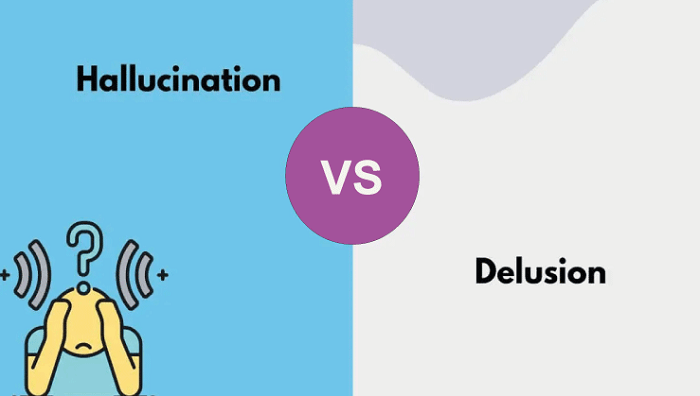Difference Between Hallucination and DelusionsPeople who suffer from certain psychiatric disease like schizophrenia, bipolar disorder, and depression can also be found with symptoms of hallucination and delusions, the most common types of perceptions and beliefs found in such people. Both the conditions can magnificently impair a person's ability to perform daily life activities in a normal way, it eventually leads to social isolation, loss of employment or even to poor quality life. However, despite certain similarities, hallucination and delusion are two different phenomena that differ in terms of their nature, onset, and even in diagnostic criteria that is conducted under doctor's observation. 
Definition of Hallucination and IllusionHallucination can be stated as a sensory perception that occur in the absence of any external stimulus. It can include any of the 5 senses present in the human body- Vision, Audio, Olfactory, Gustatory, and tactile sensation. If the person is suffering from hallucination then they might see imaginary objects near them or even see people, they may hear voices, they may smell certain odors that actually don't exist, they may feel that something is crawling on their skin, or may have a taste of unusual flavors. On the other hand, Delusions are false belief that are held with absolute conviction. By this we state that, if the person is having delusion, they believe it with full conviction despite of any evidences present. Delusions can be related to themes like- persecution, grandiosity, control, reference, or somatic complaints. Here is an example that will help you understand the concept of delusion in a better way- if the person is having delusions, then they might believe that they have special powers, they might believe that they are being spied by the agents of the government, they might think that their abilities are being controlled by an external force, or even that their body is infested with parasites, and all these events are actually not occurring but the patient is fully convinced with his or her thoughts. Before we discuss the difference between hallucination and delusion in more details, it is important to note that both the diseases can occur in serious mental health issues like schizophrenia, but they can also occur in other conditions. Hallucination is one such disease that it can occur in certain neurological disorder like epilepsy or even in Parkinson's disease. Delusion can occur in many psychiatric disorders, like depression or bipolar disorder, or as a result of certain medical conditions as well. Table Comparing Hallucinations and Delusions
DiagnosisIn variety of psychiatric disorders, hallucination and delusion are both the symptoms that can occur in any period of time. To diagnose hallucination or delusion, these two symptoms must be accompanied with other characteristic features as well. Some characteristic features are- disorganized thinking, social withdrawal, mood changes, or cognitive impairment. Now, we will have a look at the examples of diagnostic criteria of 2 diseases in which hallucination and delusion are prominent and visible symptoms, we are going to talk about Schizophrenia and Delusion disorder; SchizophreniaHere are the symptoms that you will find in the patient suffering from Schizophrenia: the symptoms which we are going to discuss, out of these if any 2 symptoms are visible then within 1 month period of time, then the person is indeed suffering from Schizophrenia. The person may have delusions, hallucination, disorganized speech, grossly disorganized or catatonic behavior, and other negative symptoms.
Note: The disturbance is actually not attributed to the effects of any substance or any medical condition as wellDelusional DisorderHere are the symptoms that you will find in the patient suffering from Delusion Disorder:
As said earlier, the presence of hallucination or delusions alone is not sufficient to make a diagnostic report of any specific disorder. TreatmentThe combination of Pharmacotherapy and Psychotherapy is the best treatment that is there to recover the person who is suffering from hallucination and delusions. According to the study, antipsychotic medications are used to reduce the seriousness and frequency of the symptoms. Here is a list of medicines recommended by the doctors- risperidone, olanzapine, or quetiapine. Note: It is always recommended to take any medicines after consulting the doctor.Psychotherapy in addition with medicines can help the patient recover quickly and it will also help the patient have a better lifestyle. The best psychotherapy that focuses on identifying and challenging irrational thoughts and beliefs is Cognitive-Behavioral Therapy, commonly known as CBT. By going for CBT, the patient will be able to recover better as in this therapy, doctors help the patient examine the evidences for and against their beliefs and to develop more realistic and adaptive ways of thinking. ConclusionAccording to the studies, Hallucination is a sensory experience that takes place in the absence of any external things like medicines, etc. and it can create a massive impact on the 5 senses present in the human body. On the other hand, delusions are basically false beliefs that are held with absolute conviction despite of zero evidences. It is very important to understand the major difference between hallucination and delusions so that the person can have proper treatment and can live a good quality life. Over here, it is important to note that hallucination and delusions are not always a sign of any serious mental health issue. Both hallucination and delusion can occur in other contexts as well. They can occur even in case where the person is on any substance or even in case if the person has stopped using any external substance that they used to take regularly, and they can occur even as a side effect of certain medications. It is vital for mental health professionals to conduct a comprehensive and deep evaluation to rule out any underlying medical or substance that is related to the cause before going for any diagnosis.
Next TopicDifference between
|
 For Videos Join Our Youtube Channel: Join Now
For Videos Join Our Youtube Channel: Join Now
Feedback
- Send your Feedback to [email protected]
Help Others, Please Share










